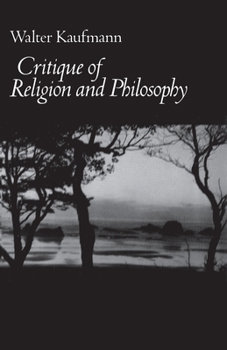Critique of Religion and Philosophy
Select Format
Select Condition 
Book Overview
From one of the major figures of twentieth-century intellectual life, an incisive critique of faith and reason in the secular age
Format:Paperback
Language:English
ISBN:0691020019
ISBN13:9780691020013
Release Date:April 1979
Publisher:Princeton University Press
Length:480 Pages
Weight:1.29 lbs.
Dimensions:1.2" x 5.5" x 8.5"
Customer Reviews
4 ratings
To Paraphase Jacques Barzun, This Book Gives Us the Illusionion We Are Living in the World of the In
Published by Thriftbooks.com User , 18 years ago
To say that Walter Kaufmann's book titled CRITIQUE OF RELIGION AND PHILOSOPHY is a thoughtfu book is an understatement. Kaufmann's book engages the reader regardless of his/her religous "convictions." This book should appeal to thoughtful Chtistians and Jews who are serious about religious thought and are not victim of "cheap grace." This book is also a thoughtful literary examination for those who are serious about philosophy. Kaufmann argues that philosophical systems are not coamprehensive enough to encompass either religion or philosophy. Kaufmann argued that systems omit too much and do not extend to ultimate values. This is one reason why Kaufmann is appreciative of Socrates/Plato. Readers are probably aware that Plato's DIALOGUES can be read for both philosophical insight and as literature. Kaufmann does not resort to theology whatever theology happens to mean these days. While theology is often based on reason, and reason is based on logic, Kaufmann argues that neither can reach religious or philosophical sublime truth. Kaufmann contrasts both philosophical systems and with literature. One of the usages that Kaufmann applies is the extensive rabbinic literature that offers stories, Hebrew poetry, and literary anecdotes to make this claim. Kaufmann is not rude to Christianity, but he subjects the history and concepts of Christianity to close examination. As one friend note, "Kaufmann is like a tough presecutor." In other words, Kaufmann makes the devout and honest Christian think about why he accepts the creeds of Christianity. When this reviewer first read CRITIQUE OF RELIGION AND PHILOSOPHY, he was surprised that Kaufmann closely "cross examined" St. Thomas Aquinas. Yet, this must admit that Kaufmann raises thoughtful questions about St. Thomas Aquinas' thinking which should be carefully read. While Kaufmann does not refer to Aquinas' poetry, sermons, and prayers, the Angelic Doctor did show a literary quality for which he deserves more credit. An enticing chapter is title "Satinic Interlude or How to Go to Hell." Kaufmann uses three dialogues in which Satan closely questions a theologian, a Christian, and an athiest. What may surprise readers is that the athiest comes out of these dialogues in bad shape. These dialogues are basically the crux of the book. Kaufmann subjects theologians to close scrutiny. He argues that theology omits too much and is often refuted by the biblical literature. In other words, Kaufmann argues that theologians make too much of a claim about God. In essence, a God that can be studied scientifically or theologically is no God at all. Kaufmann whatever the concept of God is, the concept is well beyound the limited bounds of theology. Anyone who wants to read a thoughtful classic on religion and philosophy would enjoy this book. This reviewer gave a copy to his son, and we have often returned to this book for intelligent discussion. This book should be read carefully and should en
Welcome critique of religious and philosophical idols
Published by Thriftbooks.com User , 21 years ago
I read Kaufmann twenty-five years ago (can it be?) and loved his style, his wit, and his unrelenting, merciless, and sometimes devastating critiques of our intellectual hypocrisies. I didn't agree with everything then and I don't today, but Kauffman wouldn't want that. This is Socratic philosophy at its best. Kauffman promotes a love of learning, a love of thinking, and a love of life. Not just a great intro to philosophy (which it is) but a great intro to life itself. Enjoy.
Great book on religion and Christianity
Published by Thriftbooks.com User , 25 years ago
Kaufmann was one of the most profound critics of Christianity. Unlike other philosophers who brandish external criticisms like the verification principle of meaning Kaufmann concentrates on internal flaws. He points out how theologians gerrymander the Biblical text to get it to mean anything they want. They can do this because the Bible is irreduciably ambiguous coming down squarely on both sides of every question.There is a lot of interesting material on existentialism.The book is cleary written and is characterized by Kaufmann's bubbling wit which reminds one of Russell at his best.
Critique of Religion and Philosophy, Walter Kaufmann.
Published by Thriftbooks.com User , 26 years ago
Dr. Kaufmann's humbition (his coinage for humility and ambition) to make people see "beyond black and white" is beautifully revealed in all his books including the "Critique of Religion and Philosophy". He explains how theology is dying despite its desperate measures to incorporate the philosophy of different ages from Aristotle to Heidegger in its Procrustean exegesis of the bible. He sheds light on veils of truth - subjective and objective -, the difference between truth and correctness, and belief and atheism to lay bare the complacent simple mindedness of such classifications. The concept of great philosophy has been shown to exist between analysis and existentialism, poetry and science, and a few philosophers' total disregard for psychology and a psychologist's over-interpretation. He compares various religions and scriptures for their humane, authoritarian, poetic and moral aspects, hints at Greek tragedy and shows what timeless appeal there is in their Weltanschauungs "to man's ontological interest." The author of this book, dares his readers to read well, and to reread; to think, and to rethink, more openly and vigorously. He aptly called himself "a disciple of the sarcastic Socrates."






